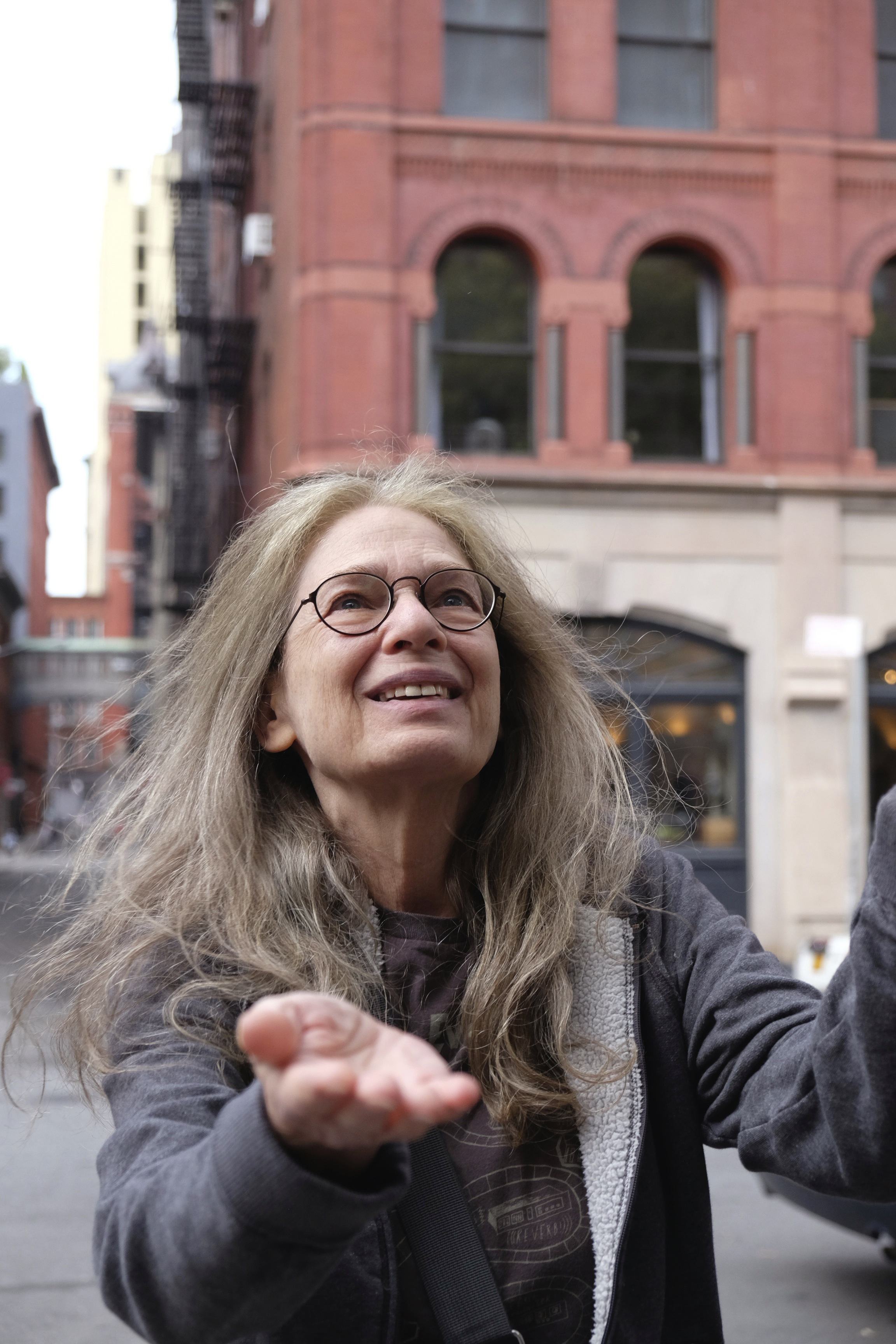
Laurie Spiegel
Laurie Spiegel (1945), a lute and banjo player by training, is a Chicago-born and New York-based composer of computer music who reacted to the futurism and dadaism of the early pioneers by developing an original aesthetic borrowed from folk music, creating relatively atmospheric and melodic music via arcane mathematical algorithms.
Her early experiments with musique concrete include Introit (1973), Water Music (1974), Music For A Garden Of Electronic Delights (1976).
Her mature and original approach is documented by the four pieces dating from 1974-76 collected on Expanding Universe (Philo, 1980). The minimalist repetition of Patchwork (1974) is couple to a gradual warping of timbres. As the pulsing pattern expands and contracts, as the timbres rise and descend, the listener falls under the spell of different levels of hypnosis. It sounds like Terry Riley's Rainbow in Curved Air without the melody. It also embodies the sound of machine music before the invention of industrial music.
Other facets are explored in the dilated, om-like Old Wave (1975) and in the aquatic refractions and fade-outs of Pentachrome (1974). The floating drones of The Expanding Universe (1975) evoke the same awe-inspiring eternity of Klaus Schulze's cosmic music. Masses of static "melodies" (stillborn melodies, that never grow to be one) keep repeating their distant wail, echoed from galaxy to galaxy, the same way that Brian Eno's ambient music does not conclude.
A much darker, imploding universe is exhibited by the computer works composed between 1987 and 1990, collected on Unseen Worlds (Scarlet, 1991 — Aesthetic Engineering, 1994), Three Sonic Spaces (1989), Finding Voice (1988), The Hollows (1990), Two Archetypes: Hall of Mirrors, Hurricane's Eye (1990), Sound Zones (1990), Riding The Storm (1990), Two Intellectual Interludes (Data and Process) (1990), A Harmonic Algorithm (1981), Passage (1987).
Obsolete Systems (Electronic Music Foundation, 2001) offers a retrospective of electronic works (mostly for analog synthesizers) composed between 1970 and 1983: Five Short Visits to Different Worlds (1977), Voices Within: A Requiem (1979), Three Modal Pieces: A Cosmos, A Legend, A Myth (1983).
She has also composed soundtracks for videos, films and ballets (The Library Of Babel, 1972; White Devil, 1972; The House Of Bernarda Alba, 1973; Emma, 1975; Narcissicon, 1976; East River, 1976; Unicorn, 1982; Precious Metal Variations, 1983; Over Time, 1984; Point McLeyvier, 1984; Gravity's Joke, 1985; Rain Pieces, 1985; Dissipative Fantasies, 1986; Music for Signals, 1986; Dryads, 1988; Continuous Transformations, 1990; A Volume of Three Dimensional, 1990).
She also composed An Isorhythmic Double Canon (1979) for string quartet, A Canon (1980) for chamber ensemble and computer, Phantoms (1980) for chamber ensemble and tape, Hearing Things (1983) for chamber orchestra, etc.
Harmonices Mundi (Table Of The Elements, 2004) contains her 1975 composition for geometric patterns of solemn computer tones.
At geometry of now Laurie Speigel presents Respite Rooms, 2017
Image by Irina Prosser
Лори Шпигель обучалась игре на лютне и банжо. Родилась в Чикаго и живет в Нью-Йорке. Будучи композитор компьютерной музыки ее реакцией на футуризм и дадаизм первооткрывателей стала разработка оригинальной эстетики, заимствованной из фолк-музыки, в которой она создавала довольно атмосферную и мелодичную музыку при помощи загадочных математических алгоритмов.
Ее ранние эксперименты с musique concrete включали «Introit» (1973), «Water Music» (1974), «Music For A Garden Of Electronic Delights» (1976).
Ее зрелый и оригинальный подход задокументирован в четырех произведениях, датированных 1974-76 годами и собранных на «Expanding Universe» (Philo, 1980). «Patchwork» (1974) совмещает минималистскую цикличность с постепенным искажением тембров. Пульсирующий паттерн расширяется и сжимается, тембры нарастают и снижаются, и слушатель оказывается под влиянием многоуровневого гипноза. Это звучит как «Rainbow in Curved Air» Терри Райли без мелодии и также воплощает в себе звучание машинной музыки до изобретения индастриала.
Распростертая, подобная мантре работа «Old Wave» (1975) и акватические рефракции и фэйд-ауты «Pentachrome» (1974) раскрывают иные грани ее творчества. Парящий дроун в «The Expanding Universe» (1975) напоминает завораживающую вечность космической музыки Клауса Шульце. Массы статичных, мертворожденных «мелодий» продолжают повторять свой отдаленный вой, блуждая от галактики к галактике; и, как и эмбиент-музыка Брайана Ино, не достигают завершения.
Гораздо более мрачная, схлопывающаяся вселенная представлена в компьютерных произведениях, сочиненных между 1987 и 1990, собранных на «Unseen Worlds» (Scarlet, 1991; Aesthetic Engineering, 1994), «Three Sonic Spaces» (1989), «Finding Voice» (1988), «The Hollows» (1990), «Two Archetypes: Hall of Mirrors, Hurricane's Eye» (1990), «Sound Zones» (1990), «Riding The Storm» (1990), «Two Intellectual Interludes (Data and Process)» (1990), «A Harmonic Algorithm» (1981), «Passage» (1987).
На «Obsolete Systems» (Electronic Music Foundation, 2001) собрана ретроспектива электронных работ (в основном для аналоговых синтезаторов), сочиненных между 1970 и 1983: «Five Short Visits to Different Worlds» (1977), «Voices Within: A Requiem» (1979), «Three Modal Pieces: A Cosmos, A Legend, A Myth» (1983).
Лори также сочиняла саундтреки для видео, кино и балета («The Library Of Babel», 1972; «White Devil», 1972; «The House Of Bernarda Alba», 1973; «Emma», 1975; «Narcissicon», 1976; «East River», 1976; «Unicorn», 1982; «Precious Metal Variations», 1983; «Over Time», 1984; «Point McLeyvier», 1984; «Gravity's Joke», 1985; «Rain Pieces, 1985; «Dissipative Fantasies», 1986; «Music for Signals», 1986; «Dryads», 1988; «Continuous Transformations», 1990; «A Volume of Three Dimensional», 1990).
Она также сочинила «An Isorhythmic Double Canon» (1979) для струнного квартета, «A Canon» (1980) для камерного ансамбля и компьютера, «Phantoms» (1980) для камерного ансамбля и кассетной деки, «Hearing Things» (1983) для камерного оркестра и т.д.
«Harmonices Mundi» (Table Of The Elements, 2004) содержит ее композицию 1975 года — геометричные паттерны, выстроенные из торжественных компьютерных звуков.
На геометрии настоящего Лори Спигел представит Комнаты отдыха, 2017